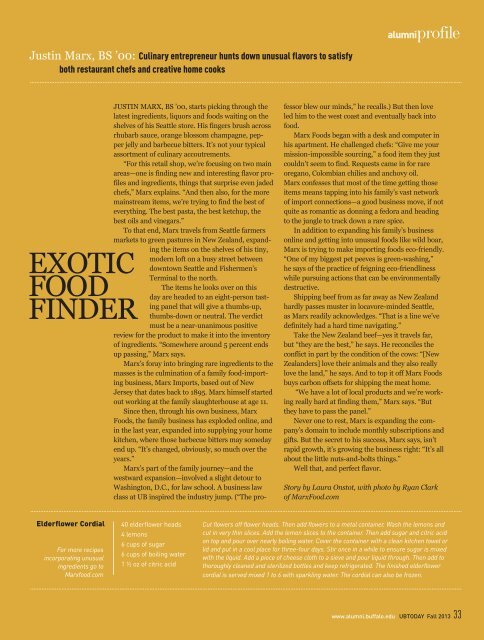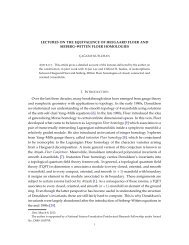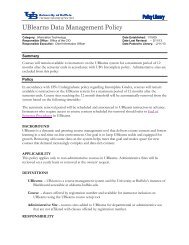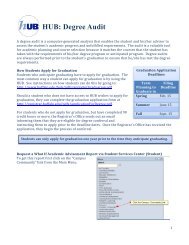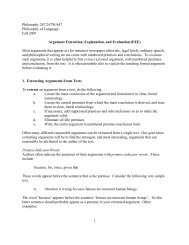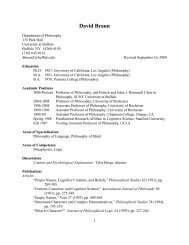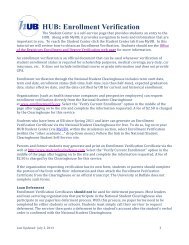A WALK IN THE WOODS - University at Buffalo
A WALK IN THE WOODS - University at Buffalo
A WALK IN THE WOODS - University at Buffalo
You also want an ePaper? Increase the reach of your titles
YUMPU automatically turns print PDFs into web optimized ePapers that Google loves.
alumniprofileJustin Marx, BS ’00: Culinary entrepreneur hunts down unusual flavors to s<strong>at</strong>isfyboth restaurant chefs and cre<strong>at</strong>ive home cooksEXOTICFOODF<strong>IN</strong>DERJUST<strong>IN</strong> MARX, BS ’00, starts picking through thel<strong>at</strong>est ingredients, liquors and foods waiting on theshelves of his Se<strong>at</strong>tle store. His fingers brush acrossrhubarb sauce, orange blossom champagne, pepperjelly and barbecue bitters. It’s not your typicalassortment of culinary accoutrements.“For this retail shop, we’re focusing on two mainareas—one is finding new and interesting flavor profilesand ingredients, things th<strong>at</strong> surprise even jadedchefs,” Marx explains. “And then also, for the moremainstream items, we’re trying to find the best ofeverything. The best pasta, the best ketchup, thebest oils and vinegars.”To th<strong>at</strong> end, Marx travels from Se<strong>at</strong>tle farmersmarkets to green pastures in New Zealand, expandingthe items on the shelves of his tiny,modern loft on a busy street betweendowntown Se<strong>at</strong>tle and Fishermen’sTerminal to the north.The items he looks over on thisday are headed to an eight-person tastingpanel th<strong>at</strong> will give a thumbs-up,thumbs-down or neutral. The verdictmust be a near-unanimous positivereview for the product to make it into the inventoryof ingredients. “Somewhere around 5 percent endsup passing,” Marx says.Marx’s foray into bringing rare ingredients to themasses is the culmin<strong>at</strong>ion of a family food-importingbusiness, Marx Imports, based out of NewJersey th<strong>at</strong> d<strong>at</strong>es back to 1895. Marx himself startedout working <strong>at</strong> the family slaughterhouse <strong>at</strong> age 11.Since then, through his own business, MarxFoods, the family business has exploded online, andin the last year, expanded into supplying your homekitchen, where those barbecue bitters may somedayend up. “It’s changed, obviously, so much over theyears.”Marx’s part of the family journey—and thewestward expansion—involved a slight detour toWashington, D.C., for law school. A business lawclass <strong>at</strong> UB inspired the industry jump. (“The professorblew our minds,” he recalls.) But then loveled him to the west coast and eventually back intofood.Marx Foods began with a desk and computer inhis apartment. He challenged chefs: “Give me yourmission-impossible sourcing,” a food item they justcouldn’t seem to find. Requests came in for rareoregano, Colombian chilies and anchovy oil.Marx confesses th<strong>at</strong> most of the time getting thoseitems means tapping into his family’s vast networkof import connections—a good business move, if notquite as romantic as donning a fedora and headingto the jungle to track down a rare spice.In addition to expanding his family’s businessonline and getting into unusual foods like wild boar,Marx is trying to make importing foods eco-friendly.“One of my biggest pet peeves is green-washing,”he says of the practice of feigning eco-friendlinesswhile pursuing actions th<strong>at</strong> can be environmentallydestructive.Shipping beef from as far away as New Zealandhardly passes muster in locavore-minded Se<strong>at</strong>tle,as Marx readily acknowledges. “Th<strong>at</strong> is a line we’vedefinitely had a hard time navig<strong>at</strong>ing.”Take the New Zealand beef—yes it travels far,but “they are the best,” he says. He reconciles theconflict in part by the condition of the cows: “[NewZealanders] love their animals and they also reallylove the land,” he says. And to top it off Marx Foodsbuys carbon offsets for shipping the me<strong>at</strong> home.“We have a lot of local products and we’re workingreally hard <strong>at</strong> finding them,” Marx says. “Butthey have to pass the panel.”Never one to rest, Marx is expanding the company’sdomain to include monthly subscriptions andgifts. But the secret to his success, Marx says, isn’trapid growth, it’s growing the business right: “It’s allabout the little nuts-and-bolts things.”Well th<strong>at</strong>, and perfect flavor.Story by Laura Onstot, with photo by Ryan Clarkof MarxFood.comElderflower CordialFor more recipesincorpor<strong>at</strong>ing unusualingredients go toMarxfood.com40 elderflower heads4 lemons6 cups of sugar6 cups of boiling w<strong>at</strong>er1 ½ oz of citric acidCut flowers off flower heads. Then add flowers to a metal container. Wash the lemons andcut in very thin slices. Add the lemon slices to the container. Then add sugar and citric acidon top and pour over nearly boiling w<strong>at</strong>er. Cover the container with a clean kitchen towel orlid and put in a cool place for three-four days. Stir once in a while to ensure sugar is mixedwith the liquid. Add a piece of cheese cloth to a sieve and pour liquid through. Then add tothoroughly cleaned and sterilized bottles and keep refriger<strong>at</strong>ed. The finished elderflowercordial is served mixed 1 to 6 with sparkling w<strong>at</strong>er. The cordial can also be frozen.www.alumni.buffalo.edu UBTODAY Fall 2013 33


